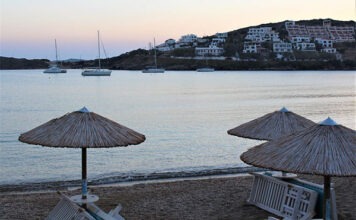- Ανεξέλεγκτη η Τουρκία, χωρίς δύναμη Βρυξέλλες και Μέρκελ έναντι των εννέα υπό την Αυστρία-Οι «χωρικές διαφορές» Ελλάδος – Τουρκίας στα περάσματα του Αιγαίου περιπλέκουν την κατάσταση. Η ναυτική δύναμη του ΝΑΤΟ έχει ελεύθερη πρόσβαση σε ελληνικά και τουρκικά χωρικά ύδατα.
Του Νίκου Αθηναίου
«Ζοφερή» χαρακτηρίζει την κατάσταση της Ελλάδος το Αμερικανικό Ινστιτούτο Γεωπολιτικών Μελετών Stratfor σε χθεσινή του μελέτη και πιστεύει ότι το σενάριο να γίνει η Ελλάδα «αποθήκη ψυχών», «δεν είναι αναπόφευκτο», παρά το γεγονός ότι «απείλησε την Ευρώπη με κοινωνική ανυπακοή» ο Έλληνας Πρωθυπουργός κ. Αλέξης Τσίπρας, προχθές στη Βουλή.
Η ρίζα του προβλήματος βρίσκεται στην Τουρκία, «παλαιού και αδιάλλακτου εχθρού της Ελλάδος». Η Τουρκία θεωρεί ότι το μεταναστευτικό είναι τριτεύουσα προτεραιότητα για αυτήν αφού προηγούνται οι άμεσες απειλές που έχει στα νότια και βόρεια σύνορά της από Συρία και Ρωσία.
Και δεν έχει λόγο να βιάζεται για το θέμα αυτό επειδή επιδιώκει τα μέγιστα δυνατά οφέλη από Ευρώπη [και αλλού, προσθέτουμε εμείς]. Η ΕΕ από την πλευρά της σήμερα δεν φαίνεται να είναι σε θέση να τη μεταπείσει ούτε με χρήματα ούτε με υποσχέσεις για επίσπευση των ενταξιακών διεργασιών στην ΕΕ.
Η μελέτη ουσιαστικά αναφέρεται στα δύο επίπεδα που εξελίσσεται το μεταναστευτικό στο Αιγαίο και την Ευρώπη, και στα προβλήματα που θα διογκωθούν για την Ελλάδα εκτός αν υπάρξει τελικά κάποια θετική εξέλιξη στις 7 Μαρτίου.
Σε ό,τι αφορά τη ναυτική δύναμη του ΝΑΤΟ στο Αιγαίο αυτή θα μπορεί «να κινείται ελεύθερα τόσο στα ελληνικά όσο και στα τουρκικά χωρικά ύδατα».
Οι εθνικές δυνάμεις των δύο χωρών θα πλέουν μόνο εντός των χωρικών τους υδάτων. Κύρια αποστολή της νατοϊκής δύναμης είναι παροχή πληροφοριών και το συντονιστικό έργο προκειμένου να εντοπίζονται παράνομοι μετανάστες που περνούν τα στενά περάσματα μεταξύ ακτών Τουρκίας και ελληνικών νησιών. Η νατοϊκή δύναμη δεν έχει δικαιοδοσία να εξαναγκάζει τα πλοιάρια των παράνομων μεταναστών να επιστρέφουν πίσω. Θα μπορεί να παρεμβαίνει άμεσα μόνο στην περίπτωση που υπάρξουν ναυαγοί, και αυτοί θα πρέπει να επιστρέφονται στην Τουρκία ανεξάρτητα με το σε ποια χωρικά ύδατα έγινε το ναυάγιο.
Η μελέτη αναφέρεται στη «δύσκολη σχέση» που έχουν Ελλάδα και Τουρκία αναφορικά με μη κατονομαζόμενες «εκκρεμείς χωρικές διαφορές» στα σημεία των εν λόγω περασμάτων, γεγονός που «είναι εμπόδιο» και «περιπλέκει τα πράγματα». Στην περίπτωση που το ελληνικό λιμενικό διασώσει ναυαγούς το ίδιο δεν είναι σε θέση να τους γυρίσει πίσω στην Τουρκία.
Σε ότι αφορά την ΕΕ, οι Βρυξέλλες και η Γερμανίδα Καγκελάριος κ. Άνγκελα Μέρκελ δεν φαίνονται προς το παρόν να έχουν επιρροή σε αποφάσεις που λαμβάνονται εκτός πλαισίου ΕΕ από τις εννέα χώρες που συναντήθηκαν χθες στη Βιέννη με πρωτοβουλία της Αυστρίας.
Μάλλον θα επιτραπεί τελικά να διέρχονται τα σύνορα μόνο όσοι πρόσφυγες προέρχονται από χώρες που βρίσκονται σε εμπόλεμη κατάσταση και ουδείς άλλος. Έτσι, οι FYROM, Αλβανία και Βουλγαρία – που «ό,τι κάνουν το κάνουν για να προστατεύσουν τα συμφέροντά τους» – θεωρούνται χώρες ιδιαίτερης σημασίας για τις εξελίξεις επειδή έχουν τα σύνορά τους σε όλο το μήκος των βορείων συνόρων της Ελλάδος και λειτουργούν ως ανάχωμα σε όσους έρχονται από Τουρκία. Θεωρητικά οι μετανάστες θα μπορούσαν να διαφεύγουν με πλοία προς την Ιταλία, αλλά αυτό δεν φαίνεται πιθανό.
Από τη στιγμή που η τύχη του θέματος «είναι έξω από τον έλεγχο του Βερολίνου και των Βρυξελλών ο κ. Τσίπρας δεν έχει καμιά δυνατότητα να διαμορφώνει τα γεγονότα. …Η αδυναμία του στα Βαλκάνια φάνηκε πλήρως όταν προχώρησε στη πιο έντονη ενέργεια στην οποία θα μπορούσε να προβεί: Την ανάκληση της Ελληνίδας Πρέσβεως στην Αυστρία για να διαμαρτυρηθεί για τις κινήσεις των εννέα χωρών»
Τα καλά νέα για την Ελλάδα μπορούν να έρθουν είτε αν η ΕΕ πείσει την Τουρκία να ελέγξει τις ροές μεταναστών προσφέροντας οικονομικά ανταλλάγματα είτε αν οι Βρυξέλλες πείσουν την Αυστρία να σταματήσει να λειτουργεί όπως τώρα, και λέγοντας στις χώρες εκτός ΕΕ ότι θα διακινδυνεύσουν την ένταξή τους στην ΕΕ.
Greece: ‘Warehouse of Souls’
Geopolitical Diary FEBRUARY 25, 2016 | 23:40 GMT Text Size Print
(Stratfor)
If Greece thought 2015 was a year to forget, 2016 is shaping up to be just as bad. This main problem for Athens this year is not so much financial as it is physical — although the economy is still reeling from the effects of last year’s capital controls and drops in investment. The bailout program forced Athens to cut spending and raise taxes, which is asphyxiating the economy. Now, Greece is in danger of being the victim of a possible solution to Europe’s migrant problem. If migrants cannot be stopped from crossing into Greece from Turkey, and they cannot be allowed to reach the main body of Europe because of all the dramatic political problems they cause, perhaps the solution is just to build a metaphorical wall around Greece? The possibility clearly disturbs Greece, whose prime minister, Alexis Tsipras, on Wednesday passionately refused to allow his country to become a “warehouse of souls.”
What is a Geopolitical Diary?
In Greece’s favor, Brussels and Berlin apparently do not want this outcome either, at least not yet. German Chancellor Angela Merkel, alongside various EU institutions, still hopes to solve the problem in Turkey — one step closer to the root of the problem. It is hoped that the Turks can be convinced to get serious about stopping the flow of migrants at a summit set for March 7. In the meantime, Merkel’s message to Greece has been to hold tight.
NATO vessels have also been deployed to the waters between Turkey and Greece in another attempt to help resolve the issue. The primary refugee route runs across the narrow stretches of water separating various Greek islands from the Turkish mainland. But efforts to stop the boats and return them to the Turkish mainland have been complicated by the fact that Greece and Turkey have a fractious relationship and outstanding territorial disputes over those very same islands and waters. This impedes cooperation between the Greek and Turkish coast guards. The NATO vessels’ official role is to provide intelligence and coordination, providing a channel for the flow of information between the two countries and informing them when migrant crossings are detected. These NATO vessels will be able to move freely in both Greek and Turkish waters while the national navies will be confined to their own territorial waters.
But NATO’s main role is not to turn back boats. The alliance will directly intervene only to rescue passengers from boats in distress and return them to Turkey, regardless of which waters they are rescued in. Still, with 325 deaths in the waterway so far this year (compared to 102,000 safe arrivals in Greece), the proportion of distressed boats would appear low. Moreover, if the Greek coast guard rescues any migrants, it is still unable to return those collected from its waters back to Turkey. This means the ultimate responsibility for stopping migrants from leaving Turkey still lies with the Turks. And therein lies the problem.
Turkey is currently confronting issues along all three of its main borders. To the south lies Syria’s civil war, to the north lies an escalating confrontation with Russia, and to the west lies the immigration crisis with Greece and Europe. Of the three, solving Europe’s migrant crisis is clearly Ankara’s lowest priority. Indeed, one could argue that the longer Turkey procrastinates on the migrant issue, the more concessions it can receive from Europe in exchange for its eventual help. Even then, Ankara does not have to commit to fully solving the problem, since it can hide behind logistical difficulties. And it is hard to imagine anything Europe could offer that would induce Turkey to take effective action. Paving the way to EU accession is becoming increasingly untenable because of Turkey’s creeping authoritarianism. And simply giving Turkey money may yield nothing more than Turkish demands for more money. European hopes that everything will turn out fine after the March 7 summit appear misguided.
Meanwhile, with the flow of migrants beginning to pick up as the weather improves and Brussels and Berlin watching on powerlessly, some countries are taking matters into their own hands. This week, Austria organized a meeting in Vienna and invited nine countries from the Balkans, including EU and non-EU members. The assembly was called for the purpose of agreeing on basic principles regarding migrant flows across their collective borders. The resulting agreement is a formalization of some of the steps that have already been taken — for example, allowing migrants from war-torn countries to cross but not others. The most important aspect, however, is that an agreement has been reached at all.
These countries, particularly Macedonia, Albania and Bulgaria, are geographically important, since they run the length of Greece’s land border from the Adriatic to the European portion of Turkey. Since this agreement is being reached outside EU jurisdiction, Brussels and Berlin’s influence is limited. The danger is that by their next meeting, the nine countries will agree to a complete lockdown. Though migrants theoretically might try to bypass the land blockade by making the maritime crossing to southern Italy, finding boats to carry them would be tricky.
Closing the borders of these nine countries would be disastrous for Greece. Already the Macedonian border has grown less porous, refusing the admittance of Afghans and limiting the acceptable migrant countries to Syria and Iraq earlier this week. A backlog of refugees subsequently began forming in Greece, with migrants being transported to soccer stadiums in Athens. Long lines of them can seen walking beside major roads when there are not enough buses to take them.
When the problem is Europe’s, Greece has some leverage. For example, there had been talk of a “cash for migrants” deal, under which the European Union would alleviate some of Greece’s financial woes in exchange for Greece’s sorting and looking after the migrants. When the reins are out of Berlin and Brussels’ hands, however, Tsipras loses any ability to shape events. Even so, he has threatened the European Union with civil disobedience until the migrant situation is resolved, saying that Greece will impede EU legislation to try to force Northern Europe to budge on the refugee issue. Meanwhile, his powerlessness in the Balkans was on full display when he took the strongest action he could, namely, recalling the Greek ambassador to Austria in protest of the group of nine’s moves.
Greece’s situation looks bleak. To the east it sees the power over migrant inflows resting in the hands of an old and intransigent adversary. To the north it sees the migrants’ potential exit being blocked by nations acting in their own interests. And the European Union and Germany, wherein Athens’ hopes had been resting, look increasingly powerless. Greece can still cling to the idea that the European Union will try to buy Turkey off — or that Brussels will pressure Austria to stop corralling the Balkans into a bloc, even swaying the Balkan countries themselves by threatening their bids to join the European Union. The warehouse of souls scenario, then, is not inevitable, but the Greeks will need some positive news soon if it is to be avoided.





























